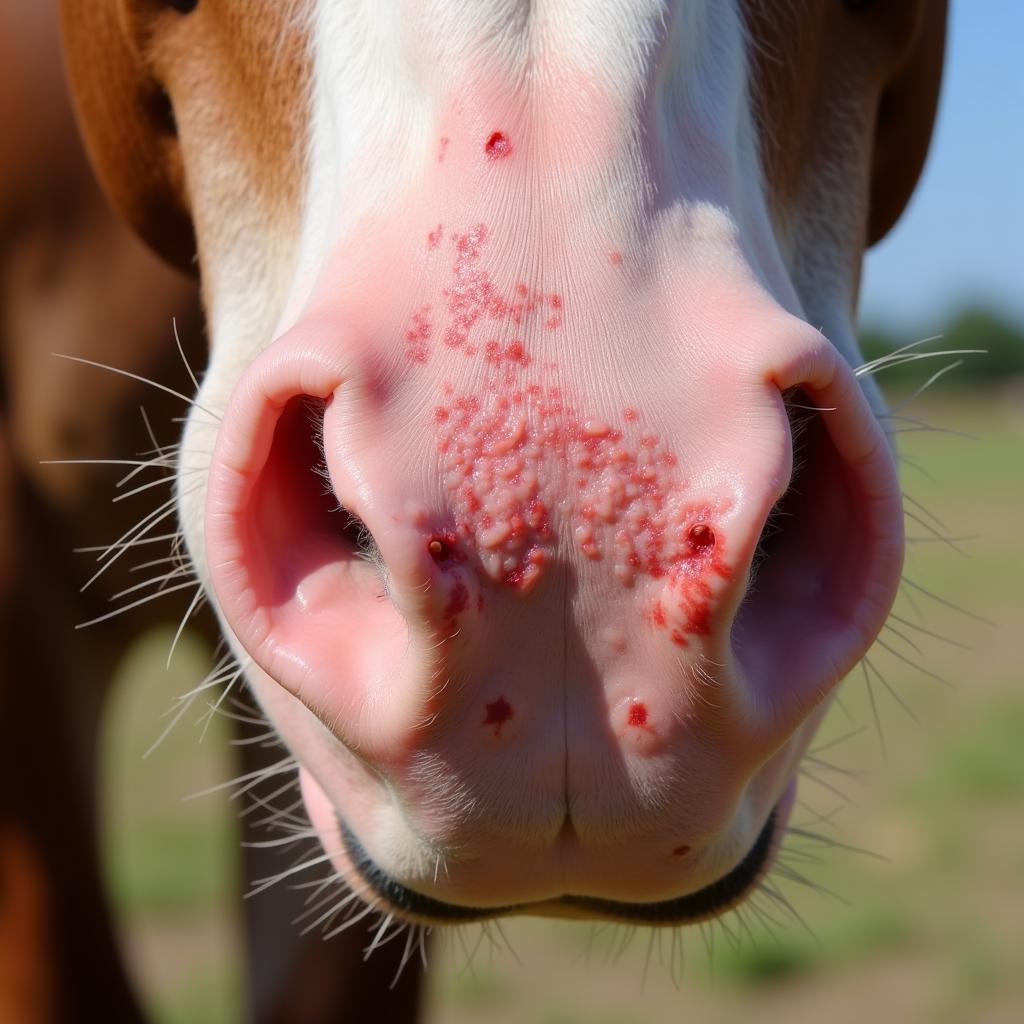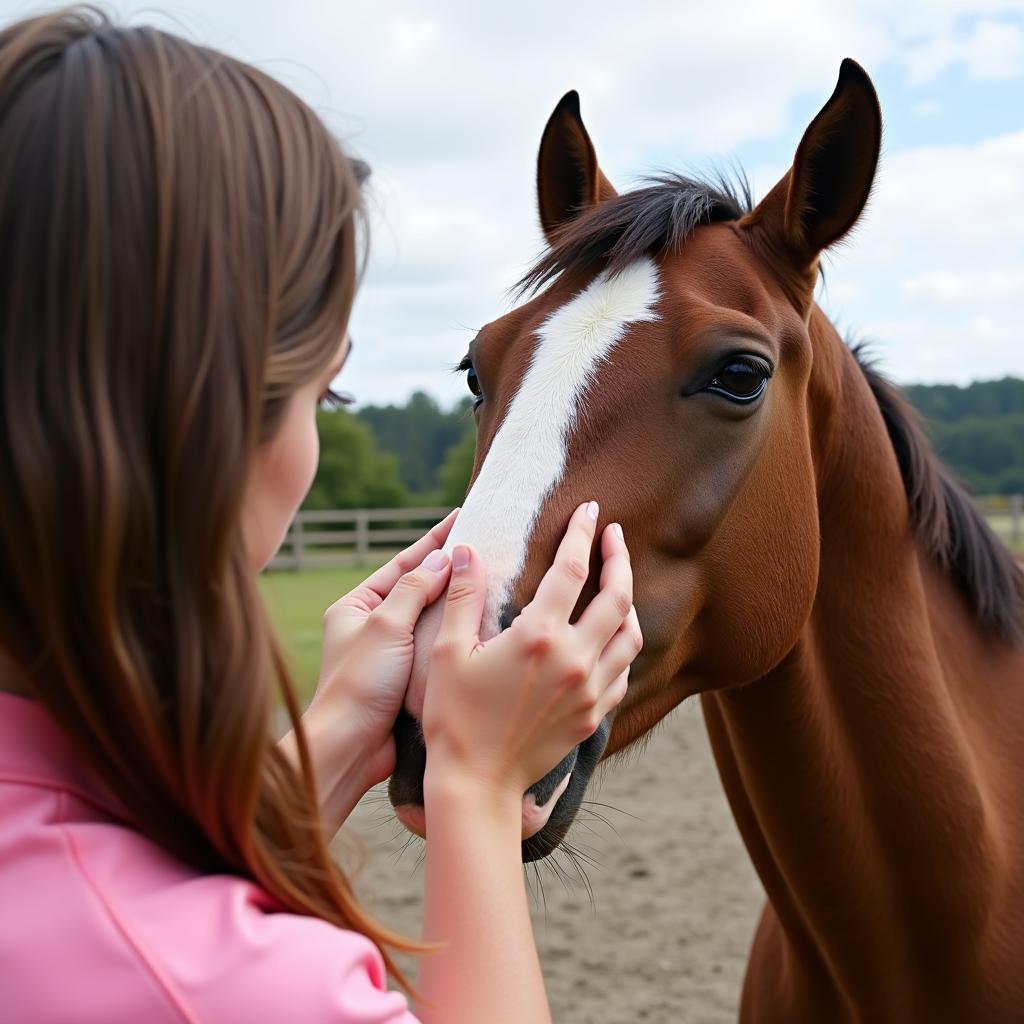Horses, like humans, can suffer from the sun’s harmful rays. While their coats offer some protection, certain areas, particularly those with pink skin or white markings, are susceptible to sunburn. Understanding the importance of sunscreen for horses and knowing how to apply it correctly can help keep your equine companion safe and comfortable, especially during long days out in the pasture.
Why Do Horses Need Sunscreen?
Horses are most vulnerable to sunburn on their muzzles, especially pink-skinned ones. Other susceptible areas include the ears, especially the tips, and any white markings on their bodies. Just like humans, horses can experience pain, peeling, and even skin cancer from prolonged sun exposure.
 Horse with sunburn on pink muzzle
Horse with sunburn on pink muzzle
Choosing the Right Sunscreen for Your Horse
Not all sunscreens are created equal, especially when it comes to your equine friend. Here’s what to look for:
- Equine-Specific: Opt for sunscreens specifically formulated for horses. These are designed to be safe if accidentally ingested and are less likely to irritate their sensitive skin.
- Broad Spectrum Protection: Choose a sunscreen with a Sun Protection Factor (SPF) of 30 or higher and offers protection from both UVA and UVB rays.
- Water and Sweat Resistant: Horses sweat, especially during warmer months. Look for a sunscreen that can withstand moisture and maintain its effectiveness.
- Free of Harmful Chemicals: Avoid sunscreens containing zinc oxide, PABA, or other ingredients that could be toxic to horses if ingested.
How to Apply Sunscreen to Horses
Applying sunscreen to a horse can be tricky, but with a little patience and the right technique, you can ensure complete protection.
- Introduce Gradually: Horses are sensitive to new smells and sensations. Before the first full application, introduce the sunscreen by letting your horse sniff it and rubbing a small amount on a less sensitive area, like their neck.
- Choose the Right Time: Apply sunscreen to a dry, clean coat, ideally before turning your horse out in the sun.
- Apply Generously: Don’t be shy with the sunscreen. Apply a thick layer to all exposed areas, paying close attention to the muzzle, ears, and any white markings.
- Reapply: Reapply sunscreen every few hours, especially after sweating or swimming.
 Applying sunscreen to a horse's muzzle
Applying sunscreen to a horse's muzzle
Other Ways to Protect Your Horse From the Sun
Sunscreen is just one aspect of sun safety for horses. Consider these additional protective measures:
- Provide Shade: Offer access to a shaded area, such as a run-in shed or trees, where your horse can escape the direct sun, especially during the hottest parts of the day.
- Limit Sun Exposure: If possible, limit your horse’s turnout during peak sunlight hours (generally between 10 am and 4 pm).
- Fly Sheets and Masks: Consider using a UV-blocking fly sheet and mask for added protection during long periods of sun exposure.
Conclusion
Protecting your horse from the sun is crucial for their overall well-being. By choosing the right sunscreen and applying it correctly, you can help prevent sunburn and other sun-related issues. Remember, a comfortable horse is a happy horse, and a little sun protection goes a long way in ensuring their health and happiness.
FAQs about Sunscreen for Horses
1. Can I use human sunscreen on my horse?
It’s best to avoid using human sunscreen on horses. Many human sunscreens contain ingredients that could be harmful if ingested by horses.
2. How often should I reapply sunscreen to my horse?
Reapply sunscreen every few hours, especially after sweating or swimming.
3. What should I do if my horse gets sunburned?
If your horse does get sunburned, contact your veterinarian for advice on treatment.
4. Can I use baby sunscreen on my horse?
While baby sunscreens might seem gentler, it’s still best to use an equine-specific product.
5. Are there any natural alternatives to sunscreen for horses?
Providing shade and limiting sun exposure are the most effective natural ways to protect your horse.
Need help with fly control for your horse? Learn about our effective fly spray concentrate horse!
For more information on caring for your equine companion, explore our website or contact us at Phone Number: 0772127271, Email: [email protected], or visit us at QGM2+WX2, Vị Trung, Vị Thuỷ, Hậu Giang, Việt Nam. Our dedicated customer care team is available 24/7 to assist you.